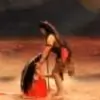Awaking after such a vision, that excellent king, moved by pity towards the deer, thus spake unto his brothers assembled there, 'Those deer that are alive after them that have been slaughtered, accosted me at night, after I had awakened, saying, 'We remain like the cues of our lines. Blest be thou! Do thou have compassion on us.' And they have spoken truly. We ought to feel pity for the dwellers of the forest. We have been feeding on them for a year together and eight months*. Let us, therefore, again (repair) to the romantic Kamyakas, that best of forests abounding in wild animals, situated at the head of the desert, near lake Trinavindu. And there let us pleasantly pass the rest of our time.' *We have been feeding on them for a year together and eight months: the original verse is: "Saashta Maasah Hi No Varshah Yad Enaan Upayunjmahe" Here Upayunjmahe has loot vibhakti in uttam purush plural number. Loot vibhakti is always used for future tense. So it means "We will spend 1 year and 8 months"
Shivang ,
I beg to differ with your interpretation here. It cannot be in future tense. Here is my anvayakrama (analysis) of the same verse.
This is the full verse:
Te satyamahuhu kartvyaa dayasmabhihirvanowkasaam
saashtamaasam hi no varsham yadenanupayunjmahe
There is no indication of future tense anywhere. Let us split it word by word:
Te satyamahuhu kartvyaa dayasmabhihirvanowkasaam
Te : they (the deer)
satyamuhuhu: speak the truth
kartvyaa: our duty
dayasmabhihirvanowkasaam : This is split like this - daya + asmaabhihi + vana + okasaam
Daya : compassion
asmaabhihi: by us
vana: forest
okasaam: dwelling, abode
Full meaning: The deer speak the truth. Compassion ought to be shown by us (since it is our duty) towards those who have this forest as their dwelling.
saashtamaasam hi no varsham yadenanupayunjmahe
sa + astha: More than eight months
hi no varsham : perhaps even a year
yad enaan: on these
upayunjmahe: we have been feeding / using
Upayunjmahe is just plain Atmanepade vartamana kaala (lat lakara) uttama purusha bahu vachana. There is no Future tense indicated anywhere.






























264